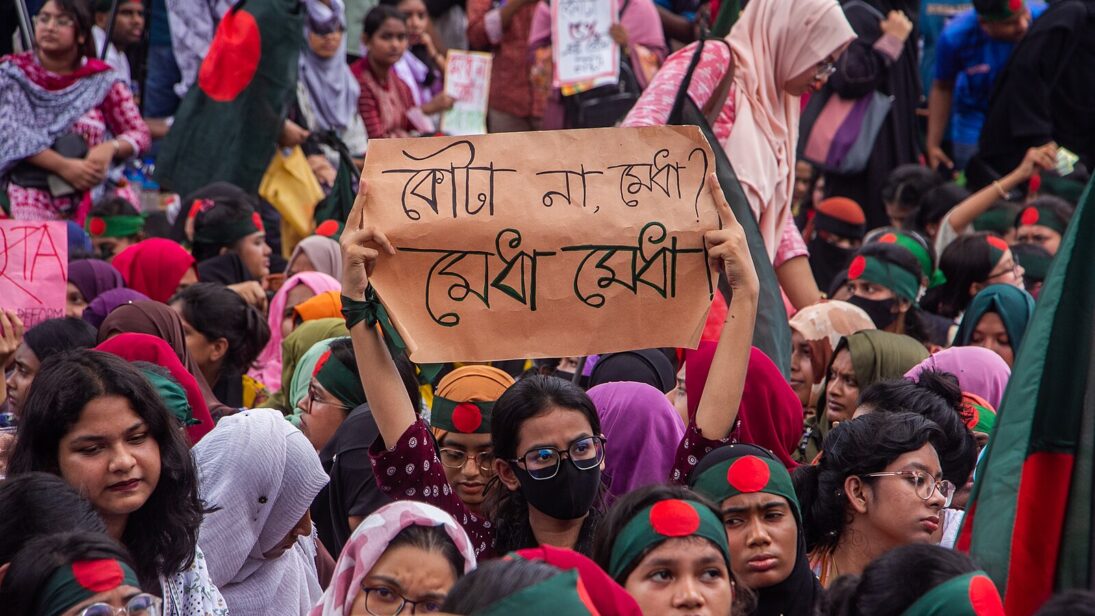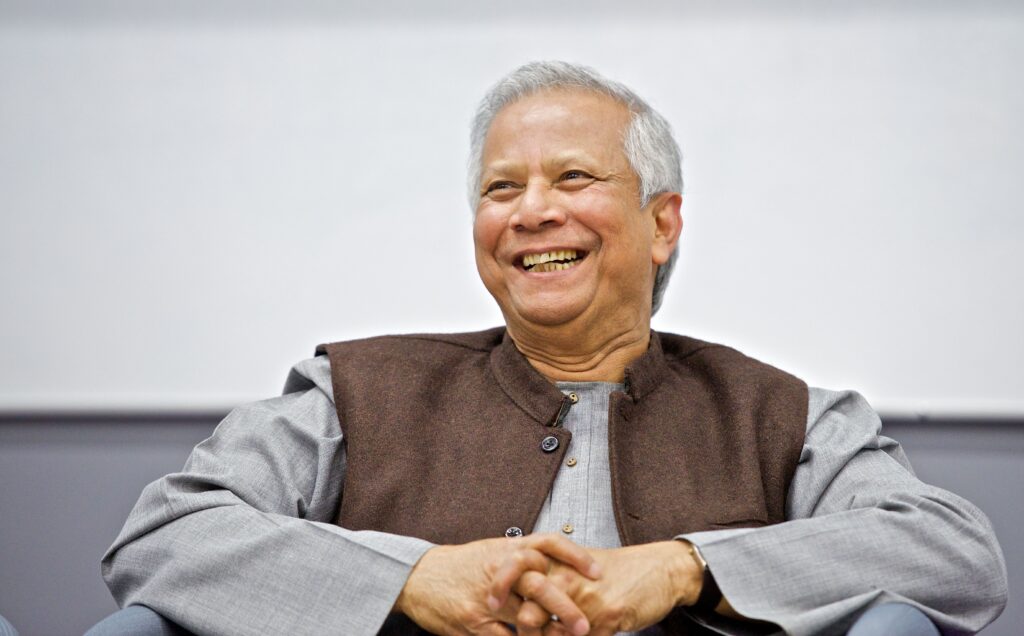
by Khandakar Tahmid Rezwan
The fall of Sheikh Hasina is arguably the most significant political event in the history of post-independent Bangladesh. Her one-and-a-half decade grip on power has finally been shaken loose by a mass uprising led by students, a feat that her opposition parties failed to achieve since she came to power in 2009. While the immediate trigger for the recent student protests was a reform of the quota system for government jobs, it was Hasina’s brute force against her own citizens and her iron-fisted governance that ultimately led to her political demise. At present, power rests in the hands of the interim government led by Nobel Laureate Dr. Muhammad Yunus. While rightly focusing on the restoration of law and order in Bangladesh, this transitional government must also prioritize foreign policy goals based on current domestic and geopolitical realities. These include balancing India and China, strengthening security on the border with Myanmar, continuing efforts to repatriate Rohingyas, and fostering greater technology and defense cooperation with the United States.
Immediate Cause of Hasina’s Downfall
Being a young country, students are a critical and influential entity in Bangladeshi politics. Thus, when Hasina’s government backed a Bangladesh High Court verdict in June to reinstate a quota system that reserved 30 percent of government jobs for the families of freedom fighters, it sparked a non-partisan and non-political student movement demanding a reform of the quota system to be based on merit. Hasina publicly labeled the students as anti-independence forces, inflaming tensions further with the protestors who were already upset with what they perceived as systemic discrimination in the form of the quota system.
While rightly focusing on the restoration of law and order in Bangladesh, this transitional government must also prioritize foreign policy goals based on current domestic and geopolitical realities.
Hasina’s next failure was her decision to deploy violent force against the protestors. She marshaled police and paramilitary forces, supported by her party’s armed cadres, against the students to suppress the movement. In response, the protests began to transform into a nation-wide public uprising when police brutally shot to death a student named Abu Sayeed on July 16, and footage of the incident went viral on social media. Even an 11-day long internet blackout didn’t halt the protests. More than 400 people, including children, died and government forces arbitrarily arrested thousands of others. Hasina, sometimes portrayed as the Mother of Humanity by Western media, transformed in the public imagination into a symbol of repression and authoritarianism.
Hasina’s final and fatal error was her arrogance. While she listened to the initial demands of the students and pulled back the unjust quota system, she enforced a curfew, deployed the army against students and failed to seriously negotiate with them, and did not apologize to the public. She continuously refused to conform to the student’s nine-point demand and blamed the carnage on opposition parties. Eventually, Hasina lost the support of the armed forces and had to resign on August 5 after a nation-wide long march to Dhaka. She fled in a military helicopter to New Delhi, while Dhaka reckoned with a new political reality. In the aftermath of her resignation, the political vacuum in the country led to further protests, jubilation, and even lawlessness, with destruction of public property and attacks on minorities.
New Geopolitical Realities
As the turmoil in Dhaka begins to subside, Yunus and his foreign advisor Md. Touhid Hossain should not only ensure domestic stability but also refocus Bangladesh’s foreign policy priorities, taking lessons from Hasina’s inaction and miscalculations with the country’s external affairs. Hasina’s tilt towards India led to Dhaka signing several agreements on transit, transshipment, and train connectivity with Delhi that have raised questions over Bangladesh’s sovereignty and likely also contributed to Hasina’s fall from grace. These debates generated a strong anti-India sentiment in the populace. Bangladesh’s historical pro-India stance under Hasina is likely to diminish under the new interim administration due to Touhid’s critical views on India over issues like alleged border killings and the need to balance geopolitical partners. However, Yunus’ interim government should also be sure not to tilt too far towards China.

Dhaka must adopt a pragmatic foreign policy approach not based on alignment, but rather on securing its national interests by working with various partners in the face of its domestic political instability. India is a natural and vital partner of Bangladesh, given trade and commerce connectivity, the import of vital goods from India, and shared waters. Therefore, despite Hasina’s fall, Dhaka must continue to cooperate with New Delhi to ensure regional stability, economic growth, and defense cooperation. Dhaka can further stabilize its relationship with India by protecting Hindu minorities alongside dismantling any haven for India’s Northeastern insurgents.
Simultaneously, Dhaka must also bolster its cooperation with its largest trading partner, China. Beijing’s technical support has been vital in building mega projects like the Padma Bridge and is therefore regarded as key to Bangladesh’s development. Both countries also have strong defense cooperation – Beijing is the primary supplier of arms to Bangladesh’s military. Despite the need for long-term diversification in arms exports, Bangladesh must continue to maintain its defense relationship with China for short-term stability.
Yunus and his cabinet are in a positive position to improve Bangladesh’s ties with Washington through a focus on democratic accountability and transparency.
Balancing relationships with India and China is also essential for Bangladesh to manage the Rohingya refugee crisis, which will continue to be a major foreign policy challenge for the interim government. Both India and China can aid Bangladesh in putting pressure on the Arakan Army (AA) and the junta-led State Administration Council (SAC) to cooperate on repatriation efforts. Dhaka is yet to establish any channels of communication with AA which now controls more than half of Rakhine State. Given that geopolitical realities dictate that the SAC is unlikely to regain control of Rakhine, maintaining balanced relationships with both India and China is essential for Bangladesh to establish a connection with AA.
Lastly, a key aspect of Bangladesh’s foreign policy in the post-Hasina era will be to bolster its relationship with the United States. Hasina and her government’s attempts to quell opposition parties, engage in human rights abuses, and allegedly rig elections, soured Dhaka-Washington relations. In contrast, due to his professional and academic engagements, Yunus shares a warm and optimistic connection with the West. He enjoys bipartisan support within the United States, reflected by 12 U.S. senators signing a petition this year calling for an end to the persistent harassment of Yunus by the Hasina regime. Former U.S. President Barack Obama and other world leaders even wrote a letter supporting his work in 2023, and Washington was one of the first to congratulate the newly formed interim government.
Therefore, Yunus and his cabinet are in a positive position to improve Bangladesh’s ties with Washington through a focus on democratic accountability and transparency. Established fields of cooperation between the two countries like mitigating poverty, Rohingya aid, education, and anti-terrorism activities must be further strengthened, while technology and defense cooperation can be further developed.
Conclusion
Bangladesh is navigating an uncertain political landscape where the focus would have to be on bringing back internal order and stability in order to concentrate on its external priorities. While focusing on foreign policy issues during this time of domestic tumult is challenging, the interim government must recognize that domestic and foreign policy issues are interconnected. Major challenges, include resolving the Rohingya crisis, increasing foreign investment and trade, and bolstering Bangladesh’s capabilities by initiating defense diplomacy, require working with external partners. A strong foreign policy refocus will inevitably stabilize the domestic situation and vice versa. Dhaka must actively work with all its foreign partners, remaining careful not to overcommit to or alienate any of them, in service of its own national goals.
source : southasianvoices
